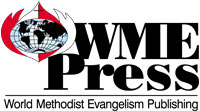I will not go into the details of his service to the Church of the Nazarene and the Wesleyan tradition beyond saying that he served as Pastor, Professor at Trevecca Nazarene College (now University), President of Trevecca, Professor at Nazarene Theological Seminary, President of NTS, Author, and General Superintendent of the Church of the Nazarene.
More of the details of his service can be found in the news release of his death, here.
What I will say is that Dr. Greathouse was the one who brought together that group of theologians who became known as the "Trevecca Connection," who purposefully worked to bring the Church of the Nazarene and the Holiness movement back to Wesley. Our Watchword & Song names H. Ray Dunning, John A. Knight, Mildred Bangs Wynkoop, and +Greathouse, himself, as the "Trevecca Connection." Rob L. Staples once (when introducing Ray Dunning during chapel at Nazarene Theological Seminary) identified himself as "a card carrying member of the 'Trevecca Connection,'" being also connected to +Greathouse and Trevecca. I don't know if he self-identifies this way, but I like to include Paul M. Bassett in that cast, as well, in that he also taught (a year) at Trevecca under +Greathouse's presidency and followed him to NTS. (And William Kostlevy's, Historical Dictionary of the Holiness Movement makes the same connection.)
Of this group, I have been highly influenced by Dunning (my college prof. of Theology), Staples (my seminary prof. of Theology), and Bassett (my seminary prof. of Historical Theology). In addition, I have in my library books by all of those in this "Connection."
This is my theological heritage. I have been trained under classical Wesleyan thought. It has shaped my life in profound ways. I am a product of the "Trevecca Connection" and like to think of myself as a part of the continuation of that Connection. I was introduced to classical Wesleyan theology at Trevecca, and that was only expanded at NTS, where I learned of Wesley's liturgical/sacramental/Anglican commitments, as well as those foundations in the Church Fathers. - Thus, Dr. Greathouse's influence and vision has shaped me.
Beyond that, during a time when I was seriously, prayerfully discerning God's direction in my life, I discussed a bit of my situation with Rob Staples, via email. Dr. Staples, asked if it was okay if he talked to Dr. Greathouse about it. Shortly thereafter, I received a phone call from +William Greathouse!
I keep framed in my study a quote from Dr. Greathouse. I have for years, now. I have used it often as a part of my "signature" on my emails. (In fact, Dr. Greathouse, seeing it when I posted on the Wesleyan Theological Discussion list, once asked me to remind him where his quote came from!) It comes from the preface to Rob Staples, Outward Sign and Inward Grace: The Place of Sacraments in Wesleyan Spirituality. There Dr. Greathouse says:
It is time the Church of Jesus Christ overcame the disjunctions created by the 16th-century Reformation. What is called for is the "evangelical catholicism" of John Wesley's "middle way" in which the two historic Christian traditions were synthesized. In this synthesis the English Reformer not only recovered for the Church a viable doctrine of holiness but also pointed the way to a scriptural view and practice of the sacraments that is both apostolic and catholic.
Dr. Greathouse was a churchman, a pastor, an educator, a theologian, and a true bishop of the Church catholic. - One of my former college professors, upon news of Dr. Greathouse's death, said something like, "I wish Bill Greathouse could have been our Pope. Perhaps he was." - I think, perhaps, I feel what many in the Roman Catholic Church felt at the death of Pope John Paul when they began referring to him as John Paul the Great, and they called for immediate "sainthood." - Of course, in our case, we don't have to add the title Great to +William Greathouse! Still, if Nazarenes canonized saints as our RC sisters and brothers do, perhaps there would be cries of "Santo Subito!"(Saint Immediately) from the lips of Nazarenes (in English, of course!). Perhaps I would be one of those voices.
What I can say, by all accounts, +William Greathouse lived what he preached and taught. And he preached and taught holiness of heart and life. We Protestant types, of course, understand that the New Testament identifies all Christians as "saints." In Dr. Greathouse, however, it was easy to see.
The Church of the Nazarene and the Wesleyan world (indeed, the Church) has lost a great leader. We will miss him. May his influence continue on for the glory of God in Christ Jesus!
I think I will end this post using the post of another member of the Wesleyan Theological Discussion group:
O God, by your Holy Spirit you gave to some the word of wisdom, to others the word of knowledge, and to others the word of faith: We praise your Name for the gifts of grace manifested in your servant +William Greathouse, and we pray that your church may never be destitute of such gifts; through Jesus Christ our Lord, who with you and the Holy Spirit lives and reigns, one God, for ever and ever. Amen. (BCP 1979, 248-9)
______________________________
In addition to the Nazarene News link, mentioned above:
A Facebook page of memories has been set up, here
The Rev'd. Dr. Dan Boone, President of Trevecca, has written of Dr. Greathouse on his blog.










